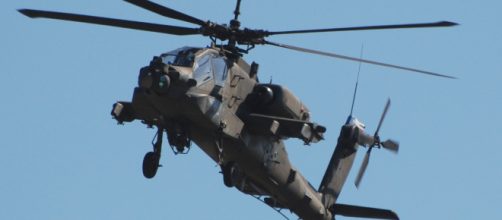The Indian military is reportedly preparing for a potential border clash with neighboring country Pakistan. Earlier this week, the Indian military announced the creation of a brand new warfighting force, the integrated battle force. This was quickly followed by the procurement and deployment of the American-made Apache attack helicopters near the Pakistani border.
According to India Today, the Indian Air Force has inducted 8 new Boeing AH-64 Apache attack helicopters at the Indian Air Force’s Pathankot airbase, which is located just 145 km from the Pakistani border.
The introduction of the Apache attack helicopters is expected to provide a major boost and new warfighting capability to the Indian Air Force.
#WATCH Punjab: The Apache chopper receives water cannon salute, before induction at the Pathankot Air Base. pic.twitter.com/YNT49rjr3B
— ANI (@ANI) September 3, 2019The Boeing AH-64 Apache is one of the world’s most advanced and most lethal attack helicopters in the world. It’s powered by two high-performance General Electric-manufactured T700 turboshaft engines. The AH-64 was designed for frontal assault and it's capable of operating in hostile airspace with threats from the ground. This flying tankbuster features a highly sensitive, nose-mounted sensor suite, which primarily used for precision target acquisition and pilot night vision system.
The high tech sensor suite also allows the helicopter to operate at night and even in adverse weather condition.
The AH-64 is armed with a 30 mm M230 gun along with a mixture of Hydra 70 rocket pods and AGN-114 Hellfire missiles. It can launch precision attacks at standoff ranges, making it more effective in attacking heavily-armed vehicles, like tanks and armored personnel carriers. Alongside, the capability to engage targets with precision-guided missiles and other ammunitions, the Apache also features modern electronic warfare capabilities for dealing with advanced EW threats. In addition to armaments and EW features, the Apache has also the ability to communicate with UAV (unmanned aerial vehicles) and even team up with UAV to attack heavily defended ground targets.
The procurement and the Apache's main mission
The AH-64 Apache attacks helicopters will replace the aging fleet of Mi35's, which have played a crucial role in securing the western border of the country. The Apache will be India’s first line of defense against any potential attack from its neighbor Pakistan.
The Indian government signed a multi-billion contract for the procurement of the 22 new AH-64 Apache helicopters with the US defense firm Boeing on September 2015. The billion-dollar contract stipulated the delivery of the first batch of the Apache helicopters on July 2019 to September 2019, while the remaining Apache will be shipped to the Indian Air Force from December 2019 to 2020.
Last year, the Indian government signed $930 contract for the delivery six Apache helicopters complete with weapon system and support system from Boeing.
The Indian Army plans to deploy the six additional Apache attack helicopters to the rugged Himalayan terrain along the China-Indian border, according to the Indian Today website. The Indian defense ministry believes that the latest procurement would significantly improve the Army’s capabilities in rugged mountainous terrains of the India-Pakistani border.
Indian Army creates a new army with cross border strike capability
In other India-related stories, the India Army has created the Integrated Battle Group, a brand new fighting force within the Indian Army. This newly formed fighting force will specialize in conducting cross border strikes near the Pakistani border, the Sputnik News reported.
The Sputnik News has not mentioned the exact number or size of the newly created fighting force, but the website said the IBG would be larger than the existing 3,000-strong brigade and smaller than a 10,000-strong division.
It will be manned by two Army officers. Relations between the two nuclear-armed nations (India and Pakistan) have further deteriorated after the Indian Air Force launched a non-military strike in allegedly terror locations in Balakot, Pakistan.


